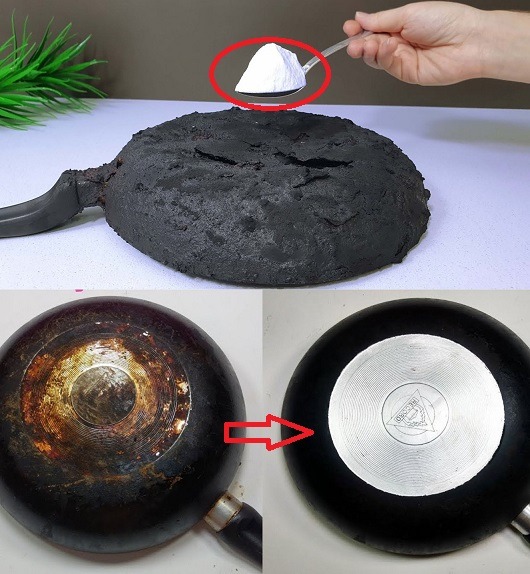ADVERTISEMENT
How to Use Vinegar:
- Fill the pan with water so that it covers the fouled area.
- Add 1/2 cup of white vinegar and bring the mixture to a simmer on the stovetop for about 5–10 minutes.
- Let it cool for a minute or two, then use a non-abrasive sponge or cloth to gently scrub away any residue.
- Rinse thoroughly with warm water and dry with a clean cloth.
Vinegar is perfect for removing oily, greasy messes and burnt food. It’s especially effective on pots and pans that have been used to cook oily foods like bacon or fried chicken.
3. Salt and Lemon: A Natural Abrasive Duo
If you don’t have baking soda on hand, salt and lemon are another great combination for scrubbing off tough stains. This method works especially well on cast iron skillets and pans.
How to Use Salt and Lemon:
- Sprinkle salt (preferably coarse salt) generously on the fouled area of the pan.
- Squeeze half a lemon over the salt and the stained surface. The citric acid from the lemon combined with the abrasiveness of the salt will help lift stains and residue.
- Scrub gently with the lemon half, using the lemon rind to scrub in small circular motions.
- Rinse the pan with warm water and dry thoroughly.
The natural acidity of lemon breaks down grease and stains, while the salt helps provide a scrubbing action to lift tough grime.
4. Dish Soap and Baking Soda for Non-Stick Pans
Non-stick pans are delicate and need special care to avoid damaging the coating. For cleaning non-stick surfaces, using a gentle, natural cleaner is important. Here’s an easy method with dish soap and baking soda that’s safe and effective.
How to Use Dish Soap and Baking Soda:
- Add a few drops of mild dish soap to your non-stick pan.
- Sprinkle a small amount of baking soda over the soap.
- Add a little warm water to the pan and let it sit for 5–10 minutes.
- Use a soft sponge or dishcloth to gently scrub the surface in circular motions.
- Rinse thoroughly with warm water and dry.
This method works great for removing grease, food residue, and minor burnt stains without compromising the integrity of the non-stick surface.
5. Boiling Water and Dish Soap: The Quick Fix
If you don’t have time to scrub, boiling water can be a quick solution to loosen up any food that’s stuck to your pan. This is particularly effective for stainless steel or aluminum pans.
How to Use Boiling Water:
- Fill the pan with water enough to cover the fouled area.
- Bring the water to a boil on the stovetop for about 5 minutes.
- After boiling, carefully pour the hot water into the sink and use a soft sponge or dishcloth to wipe away any loosened food particles.
- Rinse and dry with a towel.
This method works best for pans with general food residue but is not as effective for burnt-on or sticky messes.
6. Baking Soda + Vinegar Combo: For the Stubborn Stuff
For particularly tough messes—like burnt-on food or grease that just won’t come off—try the powerful combination of baking soda and vinegar.
How to Use Baking Soda and Vinegar:
- Sprinkle baking soda generously over the fouled area.
- Pour a small amount of white vinegar over the baking soda. The mixture will fizz and bubble, helping to lift stubborn grime.
- Let it sit for about 5 minutes, then use a soft sponge or cloth to scrub gently.
- Rinse thoroughly with warm water.
This combo is particularly effective for greasy pans, sticky spots, and tough stains.
7. How to Clean Cast Iron Pans Naturally
Cleaning cast iron requires a slightly different approach. Avoid using soap, as it can strip away the seasoning on the pan. Instead, use salt and oil for gentle scrubbing.
How to Clean Cast Iron:
- After cooking, let the pan cool slightly.
- Pour a small amount of coarse salt into the pan, and use a paper towel or clean cloth to scrub away any food residue.
- Once the pan is clean, wipe it down with a little vegetable oil to maintain its seasoning.
For stubborn residue, you can add a little water to the pan, heat it up, and scrape the food off with a wooden spoon or spatula.
Final Thoughts: Natural Cleaning Methods for Fouled Pans
There’s no need to stress over dirty, burnt, or greasy pans when you have natural cleaning solutions at your fingertips. Whether you’re dealing with a stubborn grease spot, burnt food, or just general residue, these simple, eco-friendly techniques can help get your cookware sparkling clean in just a few seconds.
By using common household items like baking soda, vinegar, salt, and lemon, you can clean your pans efficiently and safely without the use of harsh chemicals. Plus, you’ll protect your cookware from damage and keep your kitchen environmentally friendly.
Next time you find yourself facing a fouled pan, try one of these natural methods, and you’ll be amazed at how easy it is to restore your cookware to its former glory. Happy cleaning!
ADVERTISEMENT
